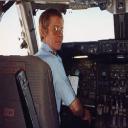Yahoo Answers is shutting down on May 4th, 2021 (Eastern Time) and the Yahoo Answers website is now in read-only mode. There will be no changes to other Yahoo properties or services, or your Yahoo account. You can find more information about the Yahoo Answers shutdown and how to download your data on this help page.
Trending News
What A Levels should I take to become a Pilot?
Hi,
I am currently doing my GCSEs including triple science. I have wanted to be a pilot since I was knee high, whether it is in commercial or military. When I was 13 I joined the air cadets and I currently hope to obtain my gliding blue wings next year (should I aim to obtain any other flying licences)? I also have built and flown model aircraft since I was 13. Now I have come to the position where I need to choose my A levels. Regarding Maths, it is not my strongest subject to say the least (I recon i will get a solid B) I hope to go on to my school's 6th form and my first thoughts were to take Physics, History, English (lang/lit) and Biology (I wanted to take Geography but I didn't do it for GCSE so I am not allowed) Are they a good choice? Should I be considering something different? If so, what A levels should I take? What are the best? Also, after I have obtained my A levels, should I get a degree (if so, in what) or should I just apply?
Thanks
Tom
4 Answers
- Skipper 747Lv 78 years agoFavorite Answer
Your GCSE is completely indedpendant of your aviation studies -
I generally recommend mathematics and physics i.e. navigation is geometry -
Physics, because of mass and balance calculations - engine power is physics too -
Nothing can be helped by biology or... history - However English is important -
Psychology might help for CRM... so is geography...
Knowing what is longitude/latitude or true north or magnetic north...
Do not worry too much about it... average education is all it takes -
The ATPL knowledge tests are requiring 17 sittings, some easy, some hard -
Many things to study...!
If you want a degree, think of one for "Plan "B" - just in case -
A degree to qualify for airlines is not as critical in UK as it is for USA airlines -
Your pilot qualifications and experience is more critical than degrees -
.
Source(s): Retired airline pilot - Anonymous8 years ago
To be perfecty frank, it does not matter at all!
Maths and Physics will help you understand things you will be taught in your later career, but what gets you hired is your ability to fly an aeroplane!
A degree, any degree, is useful, because it shows you can learn, but it should be a degree which gives you a "Plan B" if flying does not work out for you, not an aviation based degree.
What gets you into the pilot seat of a commercial aircraft these days is MONEY! Lots and lots of it!
You will start with a Private Licence, which nobody but you or someone who loves you, like your parents, will pay for.
You will then go on to Commercial Licences, Instrument Ratings and Instructor Ratings, which again, noboby but you will pay for.
Having spent about 80,000 pounds on this, you will be in a position to earn from flying aircraft. But you will be nowhere near an airline! You will need to find work instructing, flying charter, towing banners or anything else that gets your backside off the ground.
If you can go to South East Asia or Africa and get a job flying an old B737, that will help. But figure 7-10 years and 5000 "useful" hours before you get to be of interest to a major airline.
You are unlikely to sit in the Captains seat of a large aircraft until you are about 50.
Don't be down hearted about this, it is simply the road you need to take and you can have fun and a good life on the way, But GCSEs will not have any real effect along the road.
Source(s): Retired Airline Captain - Anonymous8 years ago
If you take A-levels in maths and physics it will help you with certain portions of the ground training required to become a pilot. A few flight schools require A-levels in those subjects, but most do not. In fact, most flight schools (at least in the UK) do not have any academic requirements at all. You simply need to be of minimum age, be able to obtain a medical certificate, and be able to afford training. with O-level courses in maths and physics you may find it a bit harder, but it's doable if you apply yourself. No worries unless you are after the RAF or a school like Oxford.
- 5 years ago
It appears like you will have what you must qualify for pilot coaching. There is one more thing I can advise: Geography. In at the moment of digital computer systems, devices, radios etc, there's a probability of both the gear failing or a vigour failure. In the occasion both or each must arise, a pilot demands to reduce his altitude and seem for recognizable landmarks to investigate his position. This is for each civilian and navy pilots.



